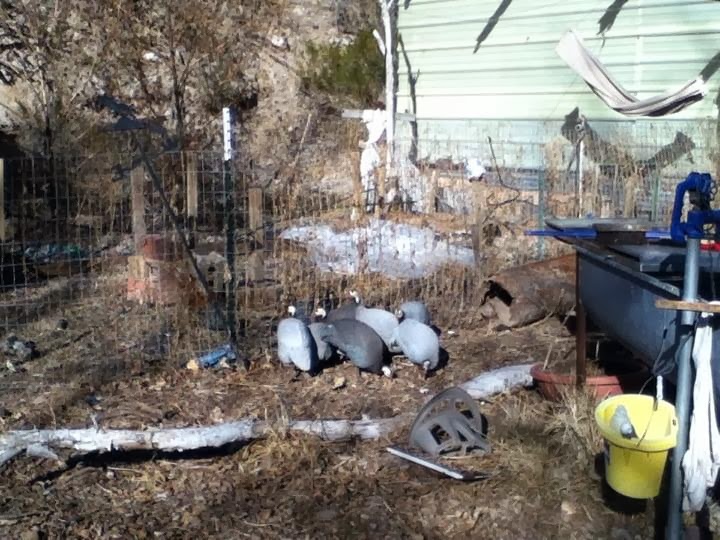At PnS Farm we have allowed our animals to be pastured or free ranged as oppose to keeping them penned up 365 days a year.
They all have a wonderful coop. It is complete with nesting boxes, unique perches, along with food and water. Each morning, we head out to the coop and open the gates and allow them out to find grass and other greens in the morning, but as the day warms up, they may get an insect or two.
We currently have 2 turkeys, 13 hens and 2 roosters. The chickens are from two years worth of flocks. The turkeys are just coming up to 1 year old next month.
This past week, we added four guinea hens to the mix. These were natural born at the Helm's farm, down the road. Today, they met up with Murphy farms' 8 guinea between two fences. All went well.
Winter is a tough time for most animals, even in the desert. There is little food available and we see competition between the native Rio Grande Turkeys and the Heritage Turkey Tom. Our tom will actually puff up to protect the food source.
Free range is an interesting term. Legally, it means that “Producers must demonstrate to the Agency that the poultry has been allowed access to the outside.” But how does one prove that and what does it mean to be allowed outside? We have a caged run, an indoor area with brooding boxes and we have a fenced run that has no roof. Most of the daytime, however, our chickens and turkeys are allowed in the pasture, the region where our pecan and fruit trees grow.
What some farmers call “pastured” chicken is really
in line what with most consumers believe they’re getting with free range.
This means that the birds are actually kept in coops at night, but are
left to forage on grass, seeds, insects, worms and such throughout the day. Ours are supplemented with pecans and are fed grain as well. We do this because they are our meat, but overall, they have access to a variety of food
in their diet. This results in richly flavored meat or eggs. It is a better life for the animal. It’s also much more
expensive to raise animals this way. Some think it is because of the space
required. For us, it is more about the fact that we don't have fencing around the entire area to keep out all predators. Coyote, fox, mountain lion are just a few predators who feast regularly on our animals. Molli is pretty good at warning many off, but there are risks. Just before Christmas, we lost one of the two hens we had kept for this year's Turkey flock. Also, without enough space, chickens are able to turn a field into a cleared area with their pecking, so true pastured chickens will often be
moved around a very large pasture as areas they’ve torn up need time to
regrow. Unfortunately, “pastured” isn’t a legal term yet, so consumers have to do their own research on the brands that use this label. This is one of the reasons it is good to learn about local farms and to deal with trusted individuals.
This is how big the turkeys started in February!



No comments:
Post a Comment